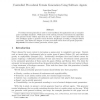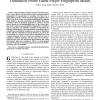TCIAIG
2010
12 years 11 months ago
2010
TCIAIG
2010
12 years 11 months ago
2010
The objective of this work is to automatically detect the use of game bots in online games based on the trajectories of account users. Online gaming has become one of the most popu...
TCIAIG
2010
12 years 11 months ago
2010
Procedural terrain generation is used to create landforms for applications such as computer games and flight simulators. While most of the existing work has concentrated on algori...
TCIAIG
2010
12 years 11 months ago
2010
Monte-Carlo tree search has recently been very successful for game playing particularly for games where the evaluation of a state is difficult to compute, such as Go or General Gam...
TCIAIG
2010
12 years 11 months ago
2010
In this paper, we applied online neuroevolution to evolve nonplayer characters for The Open Racing Car Simulator (TORCS). While previous approaches allowed online learning with per...
TCIAIG
2010
12 years 11 months ago
2010
The `Games With A Purpose' (GWAP) genre is a type of `Human Computation' that outsources certain steps of the computational process to humans. Although most GWAP studies ...
TCIAIG
2010
12 years 11 months ago
2010
This paper presents the recent technical advances in Monte-Carlo Tree Search for the Game of Go, shows the many similarities and the rare differences between the current best progr...
TCIAIG
2010
12 years 11 months ago
2010
Abstract--Fingerprinting operators generate functional signatures of game players and are useful for their automated analysis independent of representation or encoding. The theory ...
TCIAIG
2010
12 years 11 months ago
2010
It is easy to create new combinatorial games but more difficult to predict those that will interest human players. We examine the concept of game quality, its automated measurement...
TCIAIG
2010
12 years 11 months ago
2010
In this paper, we use computational intelligence techniques to built quantitative models of player experience for a platform game. The models accurately predict certain key affecti...





